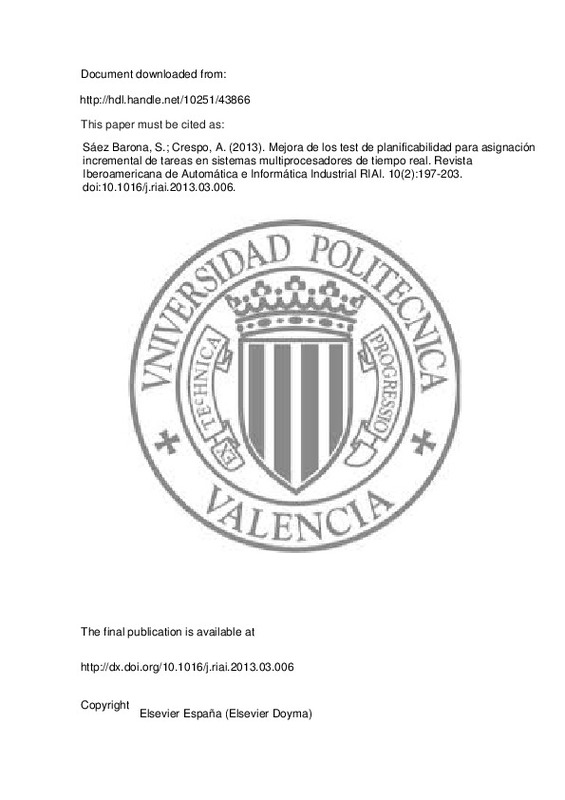JavaScript is disabled for your browser. Some features of this site may not work without it.
Buscar en RiuNet
Listar
Mi cuenta
Estadísticas
Ayuda RiuNet
Admin. UPV
Mejora de los test de planificabilidad para asignación incremental de tareas en sistemas multiprocesadores de tiempo real
Mostrar el registro completo del ítem
Sáez Barona, S.; Crespo, A. (2013). Mejora de los test de planificabilidad para asignación incremental de tareas en sistemas multiprocesadores de tiempo real. Revista Iberoamericana de Automática e Informática Industrial (RIAI). 10(2):197-203. https://doi.org/10.1016/j.riai.2013.03.006
Por favor, use este identificador para citar o enlazar este ítem: http://hdl.handle.net/10251/43866
Ficheros en el ítem
Metadatos del ítem
| Título: | Mejora de los test de planificabilidad para asignación incremental de tareas en sistemas multiprocesadores de tiempo real | |
| Autor: | ||
| Entidad UPV: |
|
|
| Fecha difusión: |
|
|
| Resumen: |
[EN] During the design of a Real-Time Multiprocessor System, schedulability tests are a key component of the task allocation algorithms. Using exact schedulability tests increases the efficiency of these allocation algorithms, ...[+]
[ES] Durante la etapa de diseño de un sistema multiprocesador de tiempo real, los test de planificabilidad son una parte clave de los algoritmos de asignación de tareas. El uso de test de planificabilidad exactos permite ...[+]
|
|
| Palabras clave: |
|
|
| Derechos de uso: | Reserva de todos los derechos | |
| Fuente: |
|
|
| DOI: |
|
|
| Editorial: |
|
|
| Versión del editor: | http://dx.doi.org/10.1016/j.riai.2013.03.006 | |
| Código del Proyecto: |
|
|
| Descripción: |
|
|
| Agradecimientos: |
Este trabajo se encuentra parcialmente financiado por el proyecto MUSES (PAID/20101002) del Vicerrectorado de Investigacion de la Universidad Polit ´ ecnica de Valencia, el proyecto ´ HI-PartES (TIN2011-28567-C03-03) del ...[+]
|
|
| Tipo: |
|







![[Cerrado]](/themes/UPV/images/candado.png)


